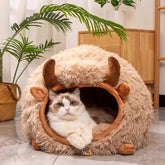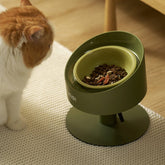Bringing your first cat home - What you need to know

Congratulations on getting your first cat! Whether you're browsing cat profiles online or visiting a reputable breeder, this is the beginning of your unique pet-parenting journey. Taking several steps before bringing your new cat home can help them get off to a good start.
Having a pet cat can be a wonderful experience. Cats are great stress relievers and amusing companions. They show affection to their owners and anyone they trust, even though they like to independently scavenge for food and explore their surroundings.
Your cat will likely meow at the door when you get home from work, excited to see you. Most cats enjoy curling up on your lap while you watch TV or read a book during your free time. This act can trigger the production of feel-good hormones in your brain, boosting your mood instantly. Research indicates that cat owners are less likely to suffer from depression than non-pet owners. Cat owners know that interacting with their cat can turn a bad day around. A cat's purr has been found to relax the nervous system and lower blood pressure. As a result, cat owners have a lower risk of heart disease and stroke. The unconditional love from a cat can be as comforting, if not more so, than from a human companion. Any cat owner can vouch for this.
Make a Cat Shopping List
Owning a cat is similar to having a child. Many people love cats for their adaptability. They make excellent pets for both large homes and small apartments, providing entertainment and companionship like a human friend. To make your new pet feel more like a part of the family, it's important to prepare for their arrival a few days in advance.
Here's a checklist for first-time cat owners:
- Food and water bowls
- Litter box and litter
- Cat toys
- Scratching posts
- A comfortable bed - even if your kitten plans to snuggle in yours!
Set Yourself Up for a Long Adjustment Phase
If you're living with cats for the first time, it's important to understand that they often perceive moving to a new home as a significant change. They might hide for a few weeks. Upon arriving at a new place, cats typically look for secure areas where they can observe their surroundings. Common hiding spots include under the bed, sofa, or in closets.

Identifying Stress in a Cat
Your new cat may initially feel stressed. Stressed cats tend to be quieter, which can make it hard to identify their stress. They are also more likely to exhibit aggressive or fearful behavior. Look for signs of stress and monitor any changes. If the stress levels of your pet increase, consider seeking help from a veterinarian or a behaviorist.
Your Cat's Diet
A cat's early life diet has a significant impact on its long-term health. As cats are often thirsty, providing them with clean, fresh water is crucial for their health. Understanding the ingredients in cat food is essential to ensure the longevity and quality of life for your new family member.
Kittens
The food you choose for your kitten is crucial due to their rapid development in the first six months. It should be balanced with a variety of protein sources, lipids, vitamins, and minerals. You can opt for either wet or dry food.
Selecting appropriate kitten food and adhering to the package's feeding instructions will ensure they receive all necessary nutrients for healthy adult cat development. Provide meals four times daily to meet their nutritional needs. After six months, you can reduce this to twice a day. Leaving food out all day is also an option, provided they are not overfed.
Adult cats
After 12 months, your kitten is considered an adult cat. At this point, you can gradually transition them to an adult diet, which can be either wet or dry food. Super-premium cat food is an ideal choice for adult cats. It is professionally formulated to include a balanced mix of proteins, fats, oils, vitamins, minerals, and carbohydrates.
Adult cat diets are typically low in fat, high in protein, and tailored to adult teeth. To avoid overfeeding, follow the feeding instructions provided on the packaging. Treats are fine, but opt for healthy choices. Whether you choose wet food, dry food, or a combination of both, depends on you and your cat's preferences.
Senior Cats
Most cats enter their senior years around the age of 7-8. Given that cats live an average of 12-18 years, and some live much longer, it's important to adapt their diet to assist healthy aging.
Senior cat food enhances digestive and immunological health as their metabolism slows down with age. For senior cats with movement impairments, diet additions like glucosamine or DHA could be beneficial. As obesity is more common in older cats, their meals should be designed to address this issue.
If your senior cat has dental sensitivity, reach out to your local veterinarian. In the interim, consider switching from dry to wet food. Wet food, due to its aroma, might be more appealing to older cats.

Keep an Eye Out for Warning Signs
Cats generally take time to adjust to new surroundings, but they will still eat, drink, and use the litter box. Kittens typically acclimate to a new home in 2-3 days, while adult cats may take up to a week. However, if you notice the following signs after bringing your new cat home, contact your vet:
- Your cat isn't eating.
- Your cat isn't drinking.
- Your cat has diarrhea.
- Your cat is vomiting.
In these situations, it's crucial to have a veterinarian checkup to detect potential health problems. The vet might prescribe stress-relieving vitamins or other methods to help reduce your pet's symptoms.
Frequently Asked Questions for First-Time Cat Owners
How much does owning a cat cost?
Purchasing a purebred cat can be costly. Cats require regular vaccinations and sometimes need to be spayed or neutered. When adopting from a shelter, the cat will likely already be spayed or neutered. However, most kittens and cats are not neutered, vaccinated, wormed, or flea-treated by their previous owners. Therefore, you will need to register with a vet. If you plan to keep your kitten, it will need to be neutered and vaccinated against contagious diseases. For specific needs, consult with your veterinarian.

Are cats safe for kids?
If you have children, you can still own a cat or kitten. Cats can make great pets, but it's vital to ensure your child's safety around them. Teach your children appropriate cat handling skills early. Cats prefer a calm, soft approach, with an extended hand, allowing them to come over if they wish. This is how you should demonstrate it.
Make sure your child knows that most cats don't like being touched on their belly, paws, rump, or tail to avoid scratches or bites. Parents' guidelines can help children develop important values like love and respect for all living beings.
Introducing a new baby or toddler to a cat can be challenging, so it's crucial to make time for everyone. If you're pregnant, there's no need to get rid of the cat. Simple cleanliness and maintenance can ensure a happy and safe coexistence when the baby arrives.
What kind of cat should I get, an adult or a kitten?
Owning a kitten allows it to become familiar with you and your family from a young age, and kittens are generally easier to train. However, they require significant attention due to their fragile bodies. They also need frequent supervision as they tend to be more energetic and mischievous.
Although mature cats tend to be more relaxed, they may have unique personalities and habits. Understanding and respecting your new feline friend will require some time. Generally, caring for an adult cat is easier than a kitten, particularly if you're busy and have limited time to spend with your cat.

Make Your Cat a Lifetime Family Member
Over months or years, you and your family will develop a deep bond with your cat, and it will become more than just a pet.
You should take pride in your profound attachment to your cat. After all, you are now an ailurophile, or a passionate cat lover. You're on the verge of joining a unique group: cat parents.







